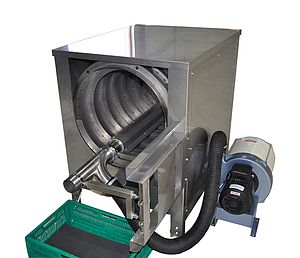Specialist aluminium scrap processing company, Alutrade Ltd of Oldbury, UK, has upgraded its can processing operation to achieve purity levels of 0.03%. This level of purity meets international recycling standards for the drinks can industry and has opened the door to many new markets. In addition, it has enabled the company to get a better price for its higher quality recycled aluminium. An essential part of this improved efficiency is the use of airknives during the separation of aluminium from non-conductive materials. Alutrade was set up originally to recycle aluminium profile scrap but 6 years ago it entered the aluminium can recycling business. This involves accepting cans in various forms including bailed, ‘clean’ loose cans and cans separated out from mixed rubbish such as domestic curb-side collections. The original multi-stage can recycling operation involved pre-shearing of the cans on entry to the process, initial magnetic removal of ferrous metals and then separation of waste from conductive material using an eddy current technique. This was followed by a hand-picking belt, a shredder, a vibrating fines separator and then one more travel over an eddy current sorting arrangement for final removal of contaminants from the shredded aluminium before weighing and bailing. This procedure achieved purity levels of around 0.15% and was acceptable at that time for can manufacturers in Europe. Then the purity specification was upgraded by Alutrade’s principal customer to 0.03%. This meant the company had to find new markets for its product whilst it found a way to improve the quality of its recycled aluminium cans. “Since the introduction of the ACI airknives the purity levels of our recycled product has improved significantly,” said Malcolm George, Director. “Consequently, this has enabled us to meet higher purity standards, broaden our markets and obtain better prices for our enhanced product quality.” The airknives are located below the two eddy current units: the first where heavies (waste) are separated from the shredded cans after the magnetic removal of ferrous metals and the second for final cleaning of aluminium shreds before weighing and bailing. Their purpose is to boost the flight of the conductive aluminium as it is ejected by the electric field created by the eddy current device (positives repelling each other) beyond a separating baffle. This greater distance of travel ensures a more positive separation of materials to achieve a cleaner end product. This same technique is also employed on another smaller line, again helping to achieve improved recycling efficiency.
Recycling efficiency boosted by airknives
Alutrade Ltd of Oldbury, UK, has upgraded its can processing operation to achieve purity levels of 0.03%
- by Air Control Industries Ltd
- April 12, 2010
- 304 views



















